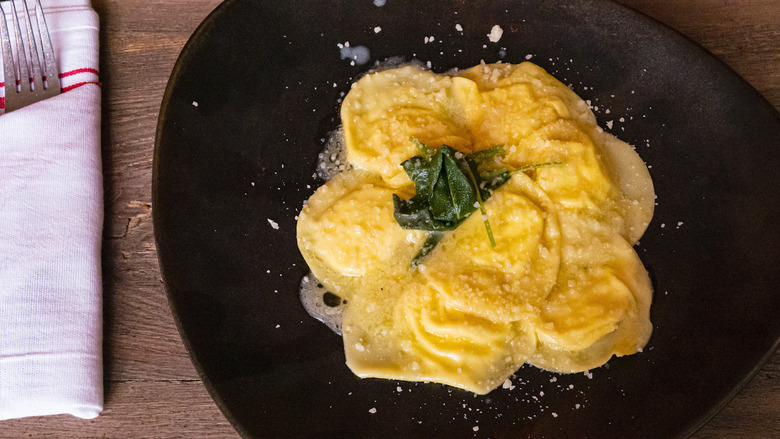Homemade Ricotta Ravioli In A Butter And Sage Sauce
Homemade Ricotta Ravioli In A Butter And Sage Sauce
Chef/owner Antonio Morichini of New York's VIA VAI grew up in Rome, Italy and traveled throughout the country perfecting the cuisine. This simple ravioli recipe can be made in large batches and frozen — just place the ravioli on a floured sheet pan in your freezer and when they're frozen you can transfer to a freezer bag. Pop them in heavily-salted boiling water for a few minutes and voila! You have homemade ravioli any night of the week.Recipe courtesy of Antonio Morichini.
Prep Time
1
hour
Cook Time
5
minutes
Servings
5

Total time: 1 hour, 5 minutes
Ingredients
- 9 ounce "00" flour
- 15 egg yolks (or 8 oz)
- 1 ounce vegetable oil
- 1 pound ricotta
- 2 ounce parmesan or grana padano cheese
- 1 teaspoon nutmeg
- 1 teaspoon salt
- 2 whole eggs (for the filling)
- truffle oil, if desired to aromatize the filling
- 6 ounce butter
- fresh sage, to taste
- 1/4 cup grated parmesan cheese (to garnish)
Directions
- In a Kitchenaid, combine egg yolks, flour and vegetable oil. Mix on medium speed. If the dough is tough, add a little water. The dough needs to be soft and elastic. Remove from bowl and make a ball with the dough. If you don’t have a Kitchenaid, the dough can be prepared by forming a well with the flour and adding the beaten egg yolks and vegetable oil in the middle. Slowly work the flour into the liquid until it is all incorporated. Knead the dough for a few minutes to make it elastic.
- Cover under a cloth or in plastic wrap. Set aside for one hour before working the dough.
- While the dough is resting, make the filling by adding the cheese, nutmeg, salt, eggs and truffle oil (if desired) in a medium-sized bowl. Incorporate all of the ingredients and mix thoroughly using a silicone or wooden spatula. Set aside.
- After the dough has rested, sprinkle flour on a work surface. Split the ball into two pieces. Working one piece at a time, roll the dough with a rolling pin to a thickness of about 2mm, i.e., very thin. The thinner the pasta, the harder it is to work but the better the outcome. If using a pasta sheeter, start the machine on the thickest setting and keep passing the pasta through, reducing the thickness every time, until reaching the thinnest setting. Each sheet should be 9 inches wide. The sheets should be rectangular and all the same length and width.
- Lay out one sheet of the pasta on a floured surface and fill a pastry bag with the filling. Starting in one corner, and about ¾ inch in from both sides, start piping the filling about 1.5 inches apart, along a line. The filling should be about the size of a hazelnut. On a 9 inch wide sheet you should have 3 rows of filling. With a kitchen brush dipped in water, brush the sides of the dough between each column of filling. Take another sheet of pasta and carefully cover the one below it. Use the outer side of your hands to create a seal around the filling. Take a ravioli cutter and center it over each ball of filling. Press down hard, slightly wiggling the ravioli cutter at the end to remove the ravioli from the rest of the sheet. Place each completed ravioli on a floured surface.
- In a pasta pot bring water to a roaring boil and add some kosher salt. Add the ravioli and let cook for about 3-4 minutes. Homemade pasta requires less time to cook than dry or store-bought pasta, and the thinner the pasta, the less time is needed.
- While the pasta is cooking, saute the butter and sage on low heat. Add 1/2 cup of pasta water to emulsify the butter. With a slotted spoon remove the ravioli and place it on top of the butter and finish cooking until butter has completely melted and emulsified. Remove from heat and garnish with grated Parmesan.